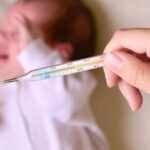With the ever-increasing prevalence of mobile devices, concerns about their potential impact on health have also risen. Among these concerns, the question, “does mobile radiation affect newborn baby?” stands out, given the vulnerability of newborns and the essential role of early development. This blog post aims to explore the effects of mobile radiation on newborn babies, delving into scientific studies, expert opinions, and practical advice for parents.
Understanding Mobile Radiation

To grasp the potential impact on newborns, it’s crucial first to understand what mobile radiation is. Mobile phones emit electromagnetic radiation in the form of radiofrequency (RF) energy. This non-ionizing radiation is different from ionizing radiation (like X-rays) and has lower energy levels. However, the long-term exposure effects, particularly on developing infants, are still a topic of active research.
Mechanism of Mobile Radiation
Mobile phones communicate with cell towers using RF waves, a type of electromagnetic radiation. When a phone is in use, it emits RF energy. This energy can be absorbed by the tissues closest to where the phone is held. For adults, this typically means the head or hip. For infants, especially those held close by a parent using a phone, the exposure might be different and potentially more concerning.
Scientific Research on Mobile Radiation and Newborns

The question “does mobile radiation affect newborn baby?” has prompted various studies, though concrete conclusions are still elusive. Here’s an overview of the current scientific understanding:
Animal Studies
Several studies using animal models have been conducted to understand the potential effects of mobile radiation on newborns. For instance, research on rodents has indicated possible impacts on brain development and cognitive functions. However, extrapolating these findings to humans requires caution due to differences in physiology and exposure levels.
Human Studies
Human studies are more challenging due to ethical considerations and the need for long-term data. Some epidemiological studies suggest a potential link between prenatal exposure to mobile radiation and behavioral problems in children. For example, a study published in the journal “Epidemiology” found that children exposed to mobile phones in the womb and after birth had a higher risk of developing behavioral issues.
Potential Health Effects

While definitive answers are still pending, several potential health effects have been proposed concerning mobile radiation and newborns:
Brain Development
The brain of a newborn is rapidly developing, making it potentially more susceptible to external influences like mobile radiation. Some studies suggest that exposure could affect neuronal development and connectivity, potentially leading to cognitive and behavioral issues.
Sleep Patterns
Radiation exposure could potentially disrupt sleep patterns, which are crucial for a newborn’s development. Some research has indicated that RF exposure can alter sleep architecture, leading to changes in the duration and quality of sleep.
Immune System
A developing immune system might also be affected by continuous exposure to RF radiation. There is some evidence to suggest that such exposure could potentially lead to alterations in immune function, making newborns more susceptible to infections and diseases.
Expert Opinions
Health organizations and experts have weighed in on the question, “does mobile radiation affect newborn baby?” with varying perspectives:
World Health Organization (WHO)
The WHO has classified RF radiation as “possibly carcinogenic to humans” (Group 2B). This classification indicates that there is some evidence of risk, but it is not conclusive. The WHO recommends further research to better understand the long-term effects of mobile radiation, especially on vulnerable populations like newborns.
American Academy of Pediatrics (AAP)
The AAP suggests minimizing exposure to mobile radiation for children and pregnant women. They advocate for precautionary measures, such as using speaker mode or earphones to keep the device away from the body.
Practical Tips for Parents

Given the ongoing research and the potential risks, it is prudent for parents to take steps to minimize their newborn’s exposure to mobile radiation. Here are some practical tips:
Limit Direct Exposure
Avoid holding the phone close to your baby’s head. Use speaker mode or earphones to keep the device away from their body.
Maintain Distance
When using a mobile phone, try to keep it at least a few feet away from your baby. This can significantly reduce their exposure to RF radiation.
Use Airplane Mode
When not using the phone for communication, switch it to airplane mode to eliminate RF radiation emissions.
Reduce Usage Time
Limit the time spent on the phone when around your baby. This reduces the overall exposure they receive.
Avoid Using Phones in the Bedroom
Keep mobile phones out of the bedroom, especially during sleep times, to minimize exposure during critical rest periods.
Long-Term Perspective
While the question, “does mobile radiation affect newborn baby?” remains a topic of ongoing research, adopting precautionary measures can help mitigate potential risks. As science progresses, we may gain clearer insights into the long-term effects of mobile radiation on newborns. Until then, a cautious approach is advisable.
Conclusion
The rapid advancement of technology and the ubiquitous presence of mobile phones raise valid concerns about their impact on health, particularly for vulnerable populations like newborns. While the current body of research does not provide definitive answers to the question, “does mobile radiation affect newborn baby?”, it does suggest potential risks that warrant caution. By understanding the nature of mobile radiation, reviewing scientific research, and considering expert opinions, parents can make informed decisions to protect their newborns. Practical steps to minimize exposure can provide peace of mind while further research continues to unravel the complexities of mobile radiation’s impact on early development.







